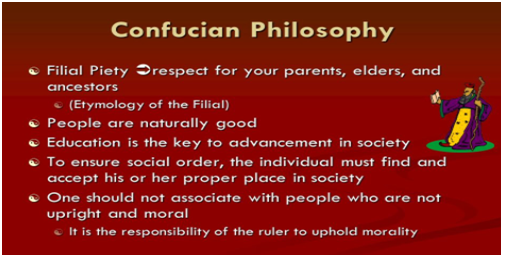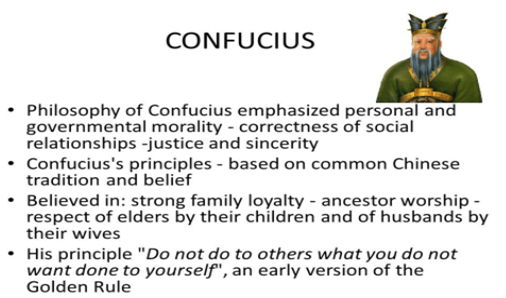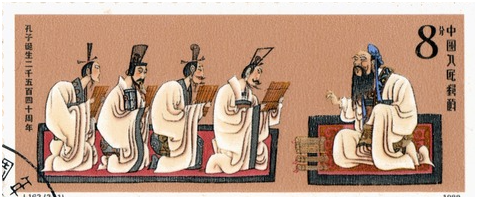Chinese philosophy assignment on value based education for the community
Question
Task: How to use Chinese philosophy assignmentto determine community focused education stratogies
Answer
Introduction
The folio below targets to analyse the Chinesephilosophy of value-based education "Integrity, harmony and peace in promoting human dignity and healthy lifestyle. In China, moral education appears as a crucial domain related to education which counts multiple aspects beyond morality.
Purpose of the folio
The main purpose of the folio is to develop an understanding of the Chinesephilosophy of value-based education for mental and physical health; ideology appears to be a crucial part of moral education in China(Grace, 2016). The influence of the philosophy of Confucianism has been found highly impactful in the understanding standard of Chinese people in their existing educational system.
“Integrity, harmony and peace in promoting human dignity and healthy lifestyle"
While talking about morality, concepts such as integrity, peace, and respect come into one's mind; however, it is very challenging to make someone understand morality within the society. As seen in the decades, moral education has a very impactful role in the educational system because of its prosaically conduct. Therefore, the way of understanding morality and teaching virtue is crucial in society and the way children are supposed to develop moral aspects(Grace, 2016). China, as a developed country, has a much-extended history when it comes to moral education, and with the passing time, both Confucianism and Socialism have had a significant impact on the people of China. This impact was evident both in terms of cognitive as well as behavioural aspects. The impact, however, can't define only as a positive one; however, in some cases, the philosophy as a whole is impacted oppositely than what it needs to be.

Moreover, as stated by Hung (2016), the concept of Chinese philosophy and its associate culture appears to be vague as well as unclear. The philosophy of Confucianism is mainly seen to signify a feature related to the Sinic world. In contrast to Western philosophy, the philosophy of China is strappingly concentrating on the matters of cultivation of an individual, communal order and harmony among the human beings and their related nature. The concept of Chinese values-based education mainly focuses on reducing the differences among the existing societies irrespective of religion, history, language etc. The Chinese philosophy of education has always been seen as a challenging aspect when it comes to luring vibrant boundaries with schools of thought(Hung, 2016). Especially in the contemporary world where the educational process is significantly impacted by the diverse and dynamic significance of the worldwide hamlet where rapid interchange and communication takes place in each aspect of human life.

In addition to that, according to Cheng (2019), moral education in China has been slowly downgraded with the application of economic improvement and an opening-up strategy. It is because of the swift growth of the arcade economy as well as the change in values due to social transformation. On the other hand, according to Berthel (2017), the concept of Confucius counts as imparting a love of knowledge and self-developed, which could later be a joy, community involvement, and social harmony for a lifetime. As identified in Confucianism, harmony can occur among individuals at any level, such as family, society, nation, and across the world and places significant weight within society and the existing natural world. In the current scenario, it has been found that liberal educational programs like Confucianism tend to diversify and improve relationships amid the dissimilar populations while recognising acquaintances across forms of information that have been isolated traditionally from each other(Berthel, 2017). As identified in the above analysis, integrity, harmony, and peace do promote human dignity and a healthy lifestyle since the Chinese philosophy of value-based education promotes healthy relationships within a society. Overall, encourages respect for each individual irrespective of a different race, religion and nation that has strengthened the philosophy of promoting value-based education as an ancient concept in China.
In the current era, the value-based education in schools and colleges is widely fascinated by the morals and teachings of the Chinese philosophy, which focuses on bringing integrity in promoting a healthy lifestyle. People in China are more focused on bringing education for earning capital and investing their time in science and technology. As per the Chinese philosopher Xeuji, students working on building their capabilities need to focus on better learning and following the right way. The right in terms of Xeuji is not limited to a single description but to follow truth and shape the education for moral purposes. Education is necessary for cultivating the path of truth and being perfect in one’s behaviour (Zhu, 2019). Therefore, it will allow for bringing integrity, harmony, and peace to a healthy lifestyle. As per the philosophy treating and approaching people with dignity allows for gaining respect, encouraging them to be calm and be in their best form. Education plays a significant role in the development and social stability, which allows treating people in the right way with the influence of education. The learners have to learn for themselves and not for others; this allows the self to interact with others with more dignity in the community. Therefore, it emphasises others learn the art of communicating and living a life of peace with morality and dignity. As per the philosophy, a humble man influences others to become humble and bring development and changes in themselves for the better. The art of learning self does not refer to self-love, but it defines as cultivating true self and knowing self and bringing changes in one by interacting with people modestly and integrating into society (Bahtilla and Xu, 2021).

Learning for self encourages people to be honest and bring goodness and righteousness in themselves, allowing for living with peace and harmony for a healthy lifestyle. As per Dewey’s and Xingzhi Tao’s philosophy, moral education supports people to live a life in the living world by suppressing the science world. It defines that people in the current era are more restricted and monotonous where integrity and dignity are being suppressed in the lives of people and children. People have to teach to live a moral life through meaningful purposes and should be in the development of children’s lives. In bringing value-based education, teachers must support their students in living a life of integrity and encourage them. The teacher’s love, ability to interact with them, and sensitivity are the fundamental sources for motivating and encouraging morality and living a life with a purpose (Cheng, 2019). Therefore, it helps in promoting a healthy lifestyle. In education, the enlightening approach needs to be implemented for the learners. The education based on morality and dignity cultivating self allows improvement and changes in themselves. Education is the only way of changing people and transforming them into being good and serving goodness to others. The term “Dao” defines the way of heaven. Confucianism elaborates that one should be committed to learning and serving love and fast to do and be good “dao” till death (Tan, 2018).
Conclusion
In Chinese philosophy, the art of leaving is through education and living a meaningful life. The education to cultivate self and bring goodness in oneself encourages others to lead a meaningful life. Confucianism, the old philosophies teach one should be ready to serve love and be good at any time, and this helps in living a healthy lifestyle with dignity and peace.
References
Bahtilla, M. and Xu, H. (2021). The Influence of Confucius’s Educational Thoughts on China’s Educational System. OALib, [online] 08(05), pp.1–17. doi:10.4236/oalib.1107370.
Berthel, K. (2017). Creating Harmony from Diversity: What Confucianism Reveals about the True Value of Liberal Education for the 21st Century. ASIANetwork Exchange: A Journal for Asian Studies in the Liberal Arts, [online] 24(2), pp.6–26. doi:10.16995/ane.177.
Cheng, H. (2019). A Critical Review of Chinese Theoretical Research on Moral Education Since 2000. ECNU Review of Education, [online] 2(4), pp.561–580. doi:10.1177/2096531119886490.
Grace, W. (2016). Bard College Bard Digital Commons The Analysis of Moral Education in China and its Effect on Chinese Children's s Moral Development. [online] Available at: https://digitalcommons.bard.edu/cgi/viewcontent.cgi article=1366&context=senproj_s2016 [Accessed 28 May 2022].
Hung, R. (2016). Kaleidoscopic View of Chinese Philosophy of Education. Educational Philosophy and Theory, [online] 48(12), pp.1197–1202. doi:10.1080/00131857.2016.1204728.
Tan, C. (2018). Confucianism and Education. [online] www.researchgate.net/. Available at: https://www.researchgate.net/publication/326412668_Confucianism_and_Education [Accessed 28 May 2022]. Zhu, H. (2019). Chinese Philosophy on Teaching and Learning: Xueji (??) in the Twenty-First Century. [online] www.tandfonline.com/. Available at: https://www.tandfonline.com/doi/abs/10.1080/00131857.2019.1608701 journalCode=rept20 [Accessed 28 May 2022].












